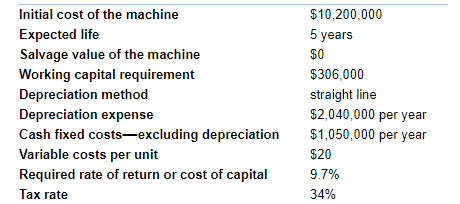



1. (Related to Checkpoint 13.2 and Checkpoint 13.3) (Comprehensive risk analysis) Blinkeria is considering introducing a new line of hand scanners that can be used to copy material and then download it into a personal computer. These scanners are expected to sell for an average price of $98 each, and the company analysts performing the analysis expect that the firm can sell 103.000 units per year at this price for a period of five years, after which time they expect demand for the product to end as a result of new technology. In addition, variable costs are expected to be $20 per unit and fixed costs, not including depreciation, are forecast to be $1,050,000 per year. To manufacture this product, Blinkeria will need to buy a computerized production machine for $10.2 million that has no residual or salvage value, and will have an expected life of five years. In addition, the firm expects it will have to invest an additional $306,000 in working capital to support the new business. Other pertinent information concerning the business venture is provided here: Initial cost of the machine Expected life Salvage value of the machine Working capital requirement Depreciation method Depreciation expense Cash fixed costs-excluding depreciation Variable costs per unit Required rate of return or cost of capital Tax rate $10,200,000 5 years $0 $306,000 straight line $2,040,000 per year $1,050,000 per year $20 9.7% 34% a. Calculate the project's NPV. b. Determine the sensitivity of the project's NPV to a(n) 9 percent decrease in the number of units sold. c. Determine the sensitivity of the project's NPV to a(n) 9 percent decrease in the price per unit. d. Determine the sensitivity of the project's NPV to a(n) 9 percent increase in the variable cost per unit. e. Determine the sensitivity of the project's NPV to a[n) 9 percent increase in the annual fixed operating costs. f. Use scenario analysis to evaluate the project's NPV under worst- and best-case scenarios for the project's value drivers. The values for the expected or base-case along with the worst- and best-case scenarios are listed here: Unit sales Price per unit Variable cost per unit Cash fixed costs per year Depreciation expense Expected or Base Case 103,000 S98 $(20) S(1,050,000) S(2,040,000) Worst Case 71,070 $89.18 $(21.80) $(1,239,000) $(2,040,000) Best Case 134,930 $118.58 $(18.40) $(924,000) $(2,040,000) 1. (Related to Checkpoint 13.2 and Checkpoint 13.3) (Comprehensive risk analysis) Blinkeria is considering introducing a new line of hand scanners that can be used to copy material and then download it into a personal computer. These scanners are expected to sell for an average price of $98 each, and the company analysts performing the analysis expect that the firm can sell 103.000 units per year at this price for a period of five years, after which time they expect demand for the product to end as a result of new technology. In addition, variable costs are expected to be $20 per unit and fixed costs, not including depreciation, are forecast to be $1,050,000 per year. To manufacture this product, Blinkeria will need to buy a computerized production machine for $10.2 million that has no residual or salvage value, and will have an expected life of five years. In addition, the firm expects it will have to invest an additional $306,000 in working capital to support the new business. Other pertinent information concerning the business venture is provided here: Initial cost of the machine Expected life Salvage value of the machine Working capital requirement Depreciation method Depreciation expense Cash fixed costs-excluding depreciation Variable costs per unit Required rate of return or cost of capital Tax rate $10,200,000 5 years $0 $306,000 straight line $2,040,000 per year $1,050,000 per year $20 9.7% 34% a. Calculate the project's NPV. b. Determine the sensitivity of the project's NPV to a(n) 9 percent decrease in the number of units sold. c. Determine the sensitivity of the project's NPV to a(n) 9 percent decrease in the price per unit. d. Determine the sensitivity of the project's NPV to a(n) 9 percent increase in the variable cost per unit. e. Determine the sensitivity of the project's NPV to a[n) 9 percent increase in the annual fixed operating costs. f. Use scenario analysis to evaluate the project's NPV under worst- and best-case scenarios for the project's value drivers. The values for the expected or base-case along with the worst- and best-case scenarios are listed here: Unit sales Price per unit Variable cost per unit Cash fixed costs per year Depreciation expense Expected or Base Case 103,000 S98 $(20) S(1,050,000) S(2,040,000) Worst Case 71,070 $89.18 $(21.80) $(1,239,000) $(2,040,000) Best Case 134,930 $118.58 $(18.40) $(924,000) $(2,040,000)










